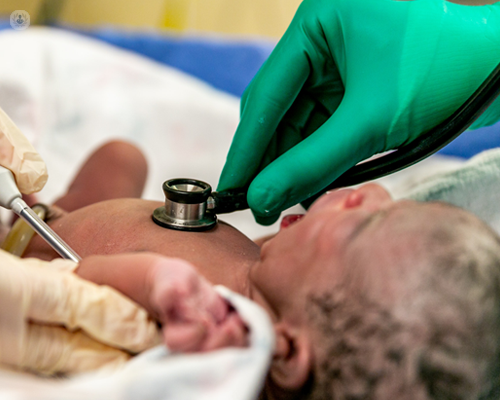All about paediatric congenital heart disease
Autore:Paediatric congenital heart disease (CHD) refers to a range of heart defects that are present at birth. They affect the structure and function of a child's heart. These defects can vary from mild conditions that may resolve over time to severe abnormalities requiring immediate medical intervention.
Here to provide an in-depth look at this condition is leading paediatric cardiology consultant Dr Florian Moenkemeyer.

What is paediatric congenital heart disease?
Understanding congenital heart defects
Congenital heart disease encompasses various structural issues within the heart that develop during foetal growth. These defects can affect the heart’s walls, valves, blood vessels, or a combination of these structures. Common types of congenital heart defects include:
- Atrial septal defect (ASD): A hole in the wall (septum) between the heart’s upper chambers (atria).
- Ventricular septal defect (VSD): A hole in the wall separating the heart’s lower chambers (ventricles).
- Tetralogy of Fallot (TOF): A combination of four heart defects that result in oxygen-poor blood flowing out of the heart and into the rest of the body.
- Coarctation of the aorta (CoA): A narrowing of the aorta, which forces the heart to pump harder to send blood through the narrowed part of the aorta.
- Transposition of the great arteries (TGA): The position of the two main arteries that leave the heart, is switched.
What causes congenital heart disease?
Congenital heart defects and their exact causes are unknown. However, certain factors may increase the risk of a child being born with a heart defect:
- Genetic factors: Family history of congenital heart defects or genetic conditions such as Down syndrome.
- Environmental factors: Maternal illnesses (e.g., rubella), certain medications, alcohol, or drug use during pregnancy.
- Chromosomal abnormalities: Changes in the number or structure of chromosomes.
What are the symptoms of paediatric congenital heart disease?
Symptoms of congenital heart disease in children can vary widely depending on the type and severity of the defect. Common signs and symptoms include:
- Cyanosis: A bluish tint to the skin, lips, and fingernails due to low oxygen levels in the blood.
- Rapid breathing: Difficulty breathing or breathlessness, particularly during feeding or physical activity.
- Poor feeding: Difficulty in feeding or poor weight gain in infants.
- Fatigue: Excessive tiredness or lethargy, especially during physical exertion.
- Heart murmurs: Unusual sounds heard during a heartbeat, often detected during routine check-ups.
How is congenital heart disease diagnosed?
Often, congenital heart disease diagnosed either during pregnancy or shortly after birth. Diagnostic methods include:
- Foetal echocardiography: An ultrasound performed during pregnancy to examine the baby’s heart.
- Echocardiogram: An ultrasound of the heart to assess its structure and function.
- Chest X-ray: Imaging to evaluate the heart and lungs.
- Electrocardiogram (ECG): A test that measures the electrical activity of the heart.
- Cardiac catheterisation: A procedure that involves inserting a thin tube into a blood vessel to reach the heart and provide detailed information about its structure and function.
What treatment options are available for congenital heart disease?
Treatment for congenital heart disease depends on the specific defect and its severity. Options include:
Non-surgical treatments
- Medications: To help the heart work more efficiently, prevent blood clots, or manage symptoms.
- Cardiac catheterisation: Procedures performed using a catheter to repair certain heart defects without the need for open-heart surgery.
Surgical treatments
- Open-heart surgery: To repair or correct structural defects within the heart.
- Heart transplant: In cases of severe heart defects that cannot be repaired.
Long-term management
- Regular follow-ups: Monitoring by a paediatric cardiologist to manage and assess the child’s heart condition.
- Lifestyle modifications: Encouraging a healthy diet, regular exercise, and avoiding smoking.
If your child requires expert paediatric congenital heart disease, arrange a consultation via Dr Moenkemeyer’s Top Doctors profile.


